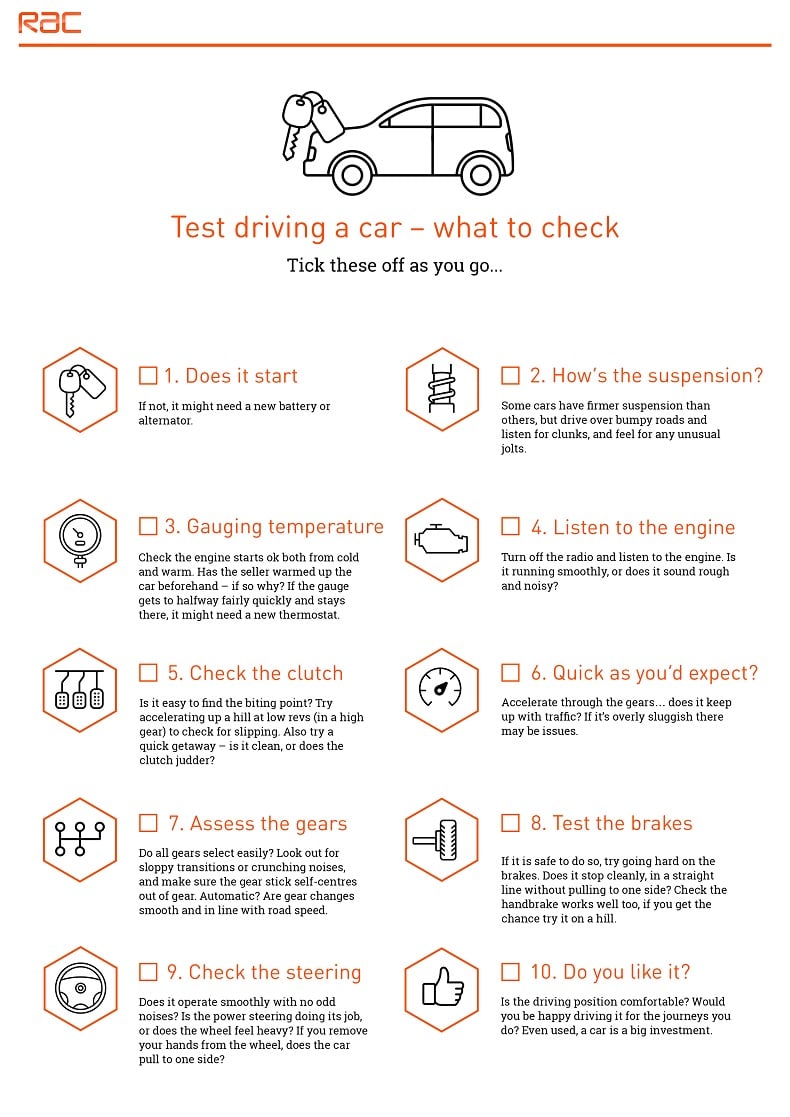A great amount of care needs to be taken to ensure you make the right purchase and aren't sold something that could come back to haunt you.
Our definitive guide offers all the help you need to help you buy with confidence and get the right deal, too.
The following advice will cover every step of the car-buying journey from choosing where to buy from to what to check when you view the car to how to handle negotiations and your buyer's rights.
Before we get started, here are some quick tips from RAC patrol Ben Aldous.
Where to buy a used car from?
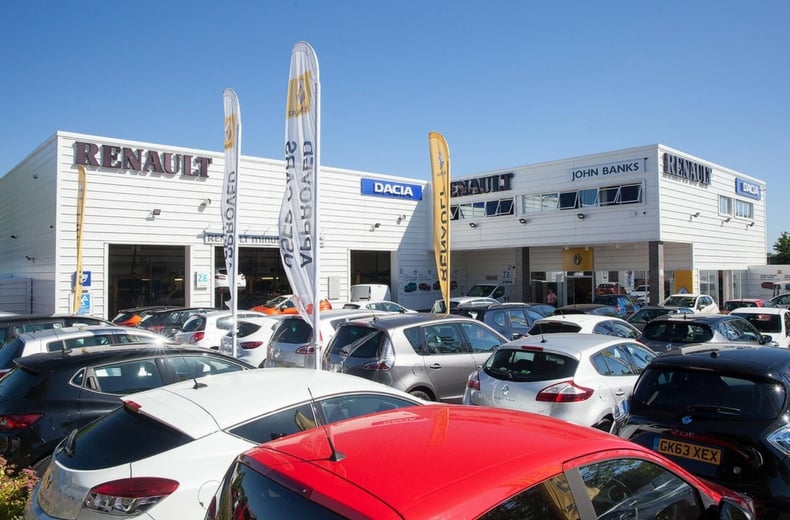
You’ve decided you want to buy a used car, but where should you buy it from?
We look through the advantages and disadvantages of different seller types, citing things to look out for and where to go to best suit your needs.
1. Buying a used car from a dealer, independent garage or driveway trader
If you’re nervous about buying a secondhand car, a dealer or trader is an easier place to start as buying privately often requires more car knowledge.
Firstly, lets understand what the concept of a trader means, as it can vary dramatically.
A trader is defined as a person acting for purposes relating to that person’s trade, business, craft or profession, meaning they can range from a single person buying and selling cars on their driveway, to a franchised dealer selling new and nearly-new cars.
The difference between these traders is the level of preparation and aftersales support you will get and also the cost you will have to pay for these premiums - the bigger the business, the more resource they have, but also the more overheads they have to pay too, which will bump up your costs.
Franchised dealers are at the largest end of the spectrum, with one-man-band driveway traders at the other and usually independent garages sitting somewhere in the middle.
Things to consider
A main dealer or garage is likely to have put a used car through a rigorous inspection and offer a good warranty (usually six or 12 months).
While this will come at a price - increasing the outright cost of buying the car - it can offer you priceless peace of mind in knowing the car has been thoroughly checked out and is covered by a warranty.
Buying from a driveway trader could save you these higher up front costs, but may prove to be a false economy as the car could end up costing you more in repairs - it's likely this person has done little more than give the car a quick wash after picking it up from a used car auction in order to flip it for a quick profit.
While all traders legally have to comply with the Consumer Rights Act - meaning you may be entitled to a repair, replacement or refund if the vehicle is deemed not ‘fit for purpose’ or ‘of satisfactory quality’ - acting on this could prove to be a headache if the seller is unscrupulous.
You may have to act fast as your right to reject the vehicle and claim a full refund because of a fault is usually restricted to the first 30 days and what you’re entitled to varies following the expiration of this date.
It is also worth noting that under the provisions of the Road Traffic Act 1988, no person can sell a motor vehicle or trailer in an unroadworthy condition, you can read more about that in our buyer's rights section.
How to decide
Consider what you're looking for and what you need the car for.
If the car is an investment - your family car, perhaps, for the next 10 years - it might make sense to pay for the security you get from a garage.
But if it is perhaps an in-between runabout for £1000, and upfront cost is your biggest factor, it might make sense to sacrifice the guarantees for the cheapest possible price.
Independent garages can vary in size (and quality), but usually cater for the middle ground of car sales - i.e. vehicles too old for main dealers, but not yet in the bargain bangers territory.
The advantage of independent garages is they often care about their reputation, and a search online can reveal how happy previous customers are.
Be cautious, though, as some won’t necessarily have done a great deal of work to prepare cars for sale, and be sure to read the terms and conditions of any warranty they offer - they’re not always worth the paper they’re written on.
If you decide to buy from a dealer, our approved dealer network can help you buy with confidence.
5 Star Defaqto rated cover
RAC Comprehensive Car Insurance Plus has been given a 5 Star Rating by Defaqto. Get a quote online today.


2. Buying a used car privately
If you’re on a budget, buying a secondhand car privately can prove to be a much cheaper option than visiting a dealer, but is it the best thing to do?
- Pros
- Secondhand cars are usually priced much more cheaply when sold privately than at a dealership and there’s often more room for negotiating as the seller isn’t attempting to make a profit
- Buying privately offers a great opportunity to meet the previous owner of the car and get a feel for how well it’s been looked after. For instance If it’s clean, with few minor bodywork faults, then it’s probably been cared for over its life. As most dealers have a professional valeter clean all their cars, it’s harder to tell how well they’ve been maintained
- Meeting the previous owner also gives you the opportunity to find out their motives for selling it - do they have a genuine reason, or is it a problematic car they want rid of?
- Cons
- Some sellers overvalue their cars, and it’s not unusual to find people asking for similar money for their pride and joy to what it might cost at a dealer, these sellers will usually bring their price down, but it could be a bit of a waiting game
- Cars sold privately won’t have been through a rigorous vehicle health check, like the ones sold at a dealership will have been, meaning you will have to be a lot more switched on with the checks you carry out when you inspect and test drive the car.
- You’ll need to bear in mind buying privately entitles you to fewer buyer’s rights than buying from a dealer too, meaning you could have no comeback if the car breaks down on the way home from buying it.
3. Buying a used car from auction
Many buyers are (sometimes rightly) cautious about buying a car from auction.
Vehicles passing under the hammer are usually being sold for a quick sale, and come with little in the way of protection such as a warranty.
Buy carefully, however, and you could grab a bargain.
- Pros
- Finding the right car for you at an auction that isn’t overly competitive could result in a real bargain
- You can snap up a car quickly and easily
- It can offer a good environment to see what people are willing to pay for a particular vehicle
- You usually have the chance to purchase before and after the auction, giving you more time to make your decision
- Cons
- It’s getting more difficult to get a bargain at auction, as many dealers are now selling part-exchanges through online auctions and there’s an increasing number of wannabe traders surfacing
- The time to make your decision is less and you might have to do so in a more pressured situation, which could lead to poor decision making
- Private buyers are cottoning on, too. Look out for cars that might be unpopular with dealers - those in unusual colours, for example, or with thirsty engines. They’ll be hard to sell on so you might get one for a good price
- You won’t be able to give the car a thorough health check or a really thorough inspection and test drive
Things to consider when buying a car from auction
If you are a first-time auction buyer then it's important to take your time and follow these simple but important rules:
- Get to the auction early and gives yourself time to inspect the vehicles you are interested in buying. Many auction houses allow a few hours of browsing before the sale
- Do your research beforehand - how much would similar cars sell for privately or at a dealer, and how much have they sold for at previous auctions?
- Speak to the auctioneer - they are there to help you and will be happy to answer any questions you may have about the sale
- Set a strict budget and stick to it. It's easy to get swept away in the heat of the sale and spend more than you intend
- Look and listen - when the car passes through the auction hall, listen to the engine and look carefully for any signs that it might not be running right
- Don't forget to include the auction fees into your budget - auction houses usually add fees on top. Find out what they are beforehand, to save any nasty surprises once you’ve bid
4. Buying a used car online
The online shopping craze is showing no sign of fading - and that includes big objects such as cars.
Although car manufacturers are finally cottoning on to selling new cars online, people have been buying used motors on the internet for years.
Most of these online sales are through online auction sites.
You can buy a car over the internet by bidding on an auction or hitting ‘buy it now’.
We’d express caution about doing this without seeing it - it’s a good idea to give it a good once over and meet the seller first, but being prepared to take a risk could bag a last-minute auction bargain.
If you do buy a car online, most buyers will expect a deposit paid via Paypal before collection.
Although sellers won’t take kindly to time wasters, if the car isn’t as described when you arrive to complete the sale, you’re free to walk away.
This takes away some of the risk - but you are contracted to buy it otherwise, even if you decide you don’t like the colour or realise the seats aren’t very comfortable.
If you buy a car online that’s a long distance away and you can’t collect it yourself, there are a number of transport companies which will deliver it to you for a reasonable cost.
Services such as Shiply allow you to request quotes from a number of different companies.
Search RAC Cars, with more than 300,000 new and used cars on its database, now.
Temporary Car Insurance
Get short term insurance from 1 hour to 30 days. It’s quick! Get covered within 15 minutes. Buy online 24/7.


Viewing a used car - what should I check?
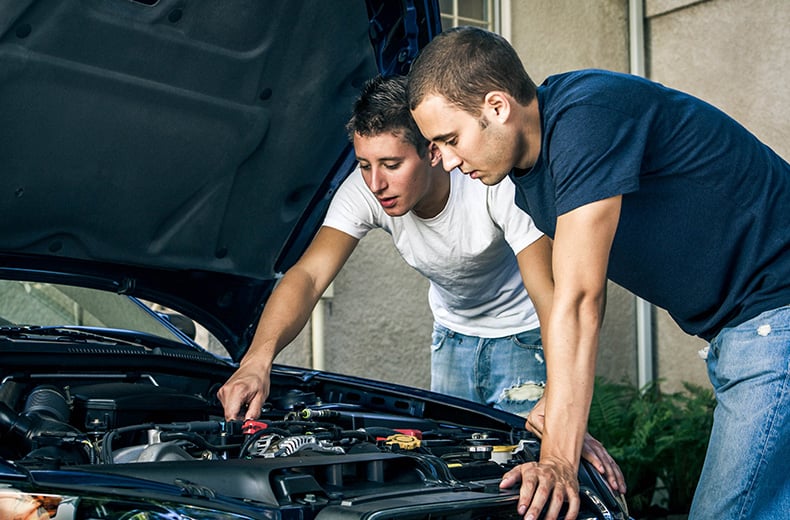
We’ve all been there… you've turned up to look at a car you’re thinking about buying, stood next to it with the seller, and realised you’ve no idea what you’re looking for.
To avoid the awkward (and pointless) situation where you walk around the vehicle kicking tyres and pretending to know what you’re looking for, follow our advice...
Car checks before buying a used car
For a start, taking along our car buyer’s checklist.
This provides a general overview for what to look out for, but a search online can give you a clearer idea of what to look for with specific make and models.
1. Tyres
The tyres must have 1.6mm as a legal minimum - if they don't then be prepared to walk away as the vehicle will not be road legal and the owner has clearly neglected the vehicle's basic maintenance.
If the tyres have less than 3mm, factor in the cost of changing them as they'll near the legal limit very soon.
While budget brand tyres might not be a major concern on a cheap car, if you’re spending more money (especially on a performance car) you’ll want four matching premium tyres.
Click here to find out how to check the legal tyre tread with a 20p.
2. Dents and scratches
How’s the bodywork? Are there signs of kerbing on the wheels? It’s important to inspect a car in clear daylight… rain or darkness can hide a lot.
Don’t be too put off by small dents or scratches, these can be fixed fairly cheaply, but do use them to negotiate.
3. Panel gaps
While you’re looking over the bodywork, check the gaps between panels - large panel gaps could be a sign that a car has been badly repaired after a crash, and make sure there aren’t any colour differences between panels.
4. Fluid levels
Open the bonnet and check all the levels - including oil, brake and power steering fluid. If they’re low, it could be a sign that the car hasn’t been well maintained.
While you’re there, look out for signs of oil leaks under the bonnet. It’s worth looking underneath where the car is normally kept, too.
5. Under the oil cap
As well as checking the oil level, it’s worth looking under the oil cap for signs of a white mayonnaise-like substance.
This could be caused by condensation, but is usually created by coolant mixing with oil - a sign that the head gasket could have failed.
Also check the coolant expansion tank looks clean.
6. Electrics
Try everything electrical. Put the windows up and down, turn the radio on and off, check the air conditioning is blowing ice cold and test any features such as heated seats.
Faults could be a simple repair, but at the very least it’s a negotiating point if something doesn’t work as it should.
7. Glass
Are there any chips in the windscreen? They could turn into cracks quickly, especially in winter, meaning you’ll have to replace the windscreen.
If they’re in the driver’s eyeline, they could be an MOT failure too.
Also look at the front and rear lights, keeping an eye out for chips, cracks and any fogging or internal moisture.
How to deal with damaged windscreens
8. Upholstery
Don’t overlook the car’s interior. Are there any stains or tears in the seats? Does it smell OK?
Bad smells can be very off-putting and hard to get rid of, especially if a car has been smoked in.
9. Spare wheel and accessories
Should the car come with a spare wheel? If so, is it there, and in good condition?
Is there a jack for lifting the car if you get a puncture, and an adapter for any locking wheel nuts fitted to the vehicle?
10. Wear and tear
All secondhand cars will display a certain amount of wear and tear, but is it consistent with the age and mileage?
A car showing low miles on the clock but showing heavy wear on the driver’s seat, steering wheel and pedals should raise alarm bells.
Click on the below image to download the checklist and take it to your viewing
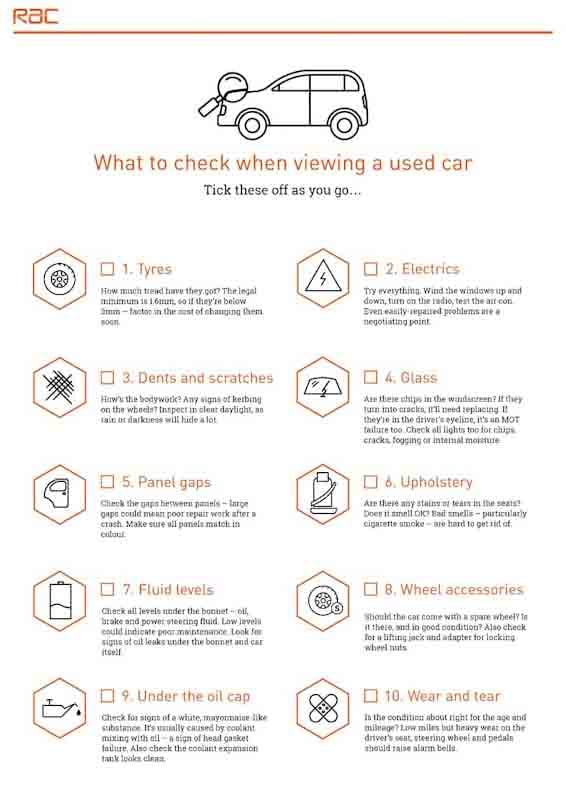
MORE ADVICE: How to spot a clocked car
This list of check will give you a good insight into what you need to look out for when inspecting a used car, however, it's always advisable to take someone with you who has a good knowledge of cars and mechanics, if you don't yourself - especially if you are spending any significant amount on the car.
If you don't know anyone to take along and need a second opinion, a vehicle inspection is a great idea.
For a fee, trained mechanics will visit the car with you and check the running order and working condition of the vehicle, potentially saving you a significant amount down the road in repairs, should they spot a lurking issue.
RAC Vehicle Inspections
Looking to buy a used car? Make sure you get what you pay for. Let us help spot issues which could lead to costly repairs.


Accident damage checks for used cars
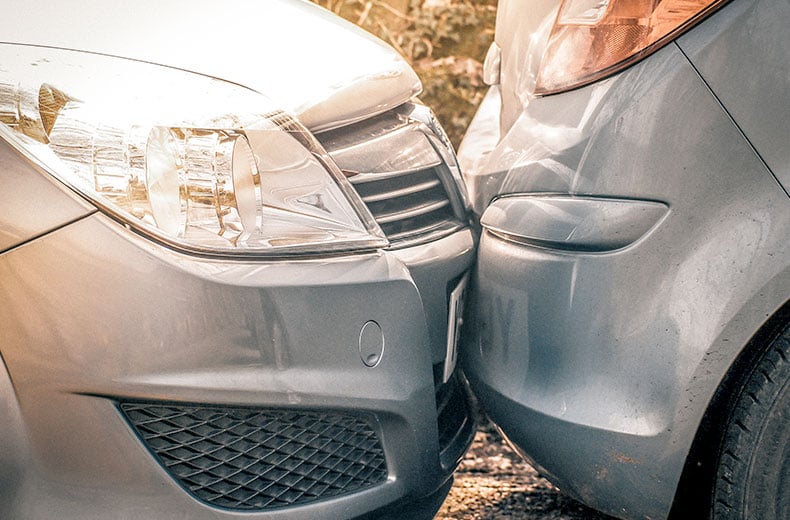
If a car has been involved in an accident then there are signs you can pick up on that might suggest a vehicle has been crashed.
- Make sure panels line up tightly - there should be small, even gap between panels, and the paint colour should match all over the car.
- Look out for ripples in the bodywork as these might suggest it’s been damaged and poorly repaired using filler - a magnet should reveal whether this is the case, as filler isn’t magnetic.
- Be familiar with the specification of the car you’re looking at: for example, if it’s a high-spec model, it might have chrome trim, so ask questions if it’s missing.
- Number plates must legally have their supplier printed on them in small letters - if it’s not a car dealer, ask why? There might be a genuine reason, such as the plate fading and needing replacing or the removal of a private registration... or it might have been damaged in a crash.
READ MORE: What is an insurance write off and should I buy one?
Documents check for used cars
The most important document you need to check when buying a secondhand car is the V5C, also known as the registration document or log book.
Make sure the make and model of the car you’re buying matches that on the V5, as well as the number plate.
You can also check that the Vehicle Identification Number known as the VIN, matches the VIN on the vehicle, which can be read from outside the vehicle in the lower part of the windscreen.
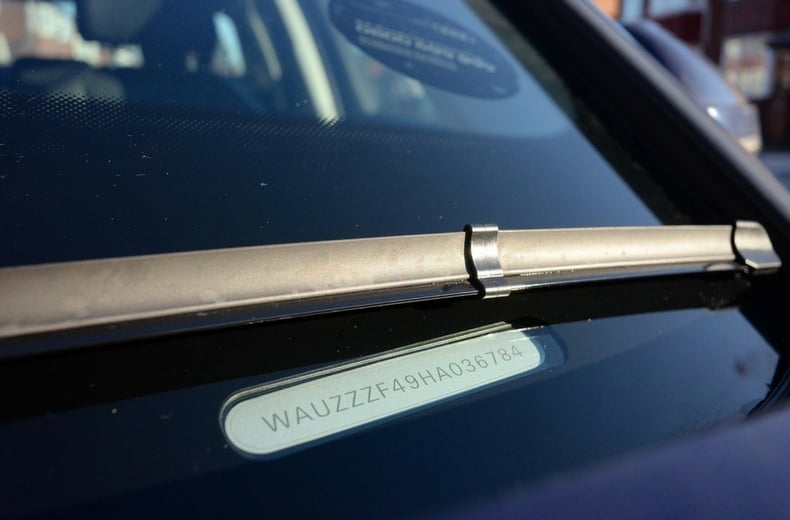
Read our full guide to VIN number checks
If you’re buying privately, check that the name of the registered keeper is the same as the person you’re dealing with, and the address is the property you’re buying the car from.
If it’s not, ask questions - the seller might be a dealer masquerading as a private seller, or the car could even be stolen.
The V5 will also tell you how long the seller has owned the car, and how many previous owners it’s had.
Be concerned if the car has had lots of owners over a short period of time - it could be problematic, although there may also be a genuine reason.
MOT and service history checks for used cars
An MOT certificate isn’t as important as it used to be - as you can now check a car’s MOT history online and find out if a car’s got a current valid MOT.
The MOT test, if you’re not familiar, is the yearly compulsory test of roadworthiness carried out on all vehicles over three years old.
Check the expiry date on the MOT certificate (or online) and take a note of any advisories that the tester has suggested.
The seller may or may not have fixed these - some are easy to check (e.g. if a tyre is low on tread), but some aren’t (e.g. underbody rust) and may hint that the seller is trying to shift a problem motor before big bills occur.
A comprehensive service history is a bonus when buying a secondhand car.
Depending on the price, age and type of car, it may or may not be important - on a £500 banger, for example, you’ll be lucky to get much in the way of service history, but on a more expensive specialist car you’ll want a fully-stamped service book to prove it’s been looked after.
Read our complete guide to MOTs to find out hints and tips like: do council MOT centres really have a better pass rate?
Used car history check
When buying a secondhand car, it’s important to find out as much as possible about its history.
This helps you find what the seller potentially doesn't want you to know.
These checks primarily reveal if there are any hidden discrepancies in the car's history, such as being written off.
Research suggests as many as one in four cars have a hidden history - this could include it being stolen or written off or having outstanding finance (which could cost you dearly).
The RAC provides a data check which will provide peace of mind for any secondhand car purchase.
As well as checking whether the car has been stolen, written off or has outstanding finance, car history checks can also provide the following:
- Any mileage discrepancies which could reveal if the car has been clocked by having the mileage deliberately wound back as well as
- Common breakdown reasons by make & model
- Common MOT failures by make and model
- An independent car review
- A vehicle valuation
- Average running costs by make and model
- Car inspection and buying checklists
It is a good idea to be inquisitive about any car you are looking to buy, and bear in mind even a car history check won't tell you absolutely everything about a vehicle.
Ask whoever you are buying a car from about its previous owners to build a picture.
For instance, has it been used as a pool car by lots of different drivers?
Has it just had a single company car driver before it went onto the market?

Cheaper than AA or we’ll beat by 20%^
• Roadside cover from £5.49 a month*
• We get to most breakdowns in 60 mins or less
• Our patrols fix 4/5 breakdowns on the spot

Used car test drive checklist
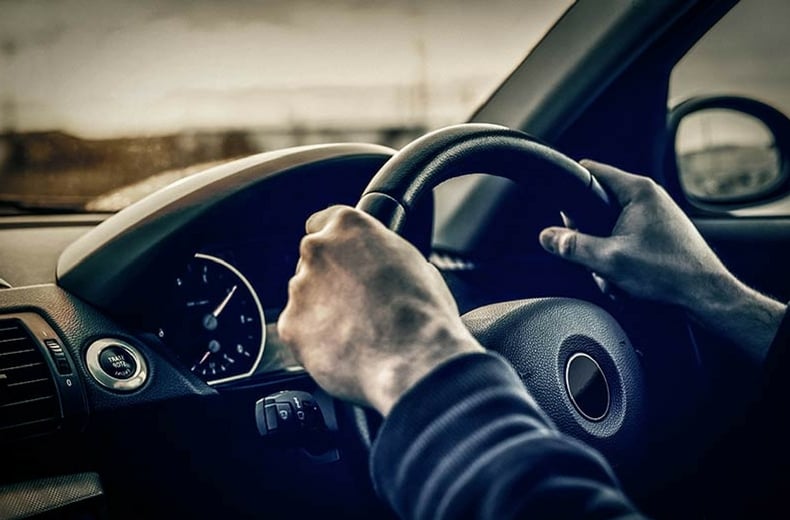
It’s important to take a test drive when you’re buying any car.
Before you do this, you’ll need to make sure you, the garage or private owner you’re buying the car from have the right insurance in place. Temporary car insurance covers you specifically for this and can be taken out for as little as an hour. It is easy to apply online and you can be on the road within 15 minutes.
These are the other important things to consider:
1. Does it start OK?
A car which is problematic to start might need a new battery. However, if the car if difficult to start, it may have a present or developing mechanic problem that will be costly to put right.
2. Check the temperature gauge when you start it
Has the seller been warming the car up beforehand? If so, why?
Check that the engine starts OK from cold if possible to do so. Also try turning it off and on after it’s been running for a while to make sure it starts when it’s warm,
3. Watch the temperature gauge
Does the car reach its operating temperature within 10 minutes and stay there? If not it might need a new thermostat, while overheating could be a sign of more serious issues.
4. Check the clutch
Is it easy to find point, or is it a long way up the pedal travel?
Try accelerating up a hill at low revs (in a high gear) to check for slipping. Also try a quick getaway - does the car pull away cleanly, or does the clutch judder?
Clutch replacement can be costly so it might be worth trying a few examples of the same model to help you understand what’s right and what isn’t.
5. Check the transmission
Do all gears select easily? They shouldn’t be too notchy or sloppy, or make crunching noises every time you change gear. and the gear stick should self-centre when you take it out of gear.
If the vehicle is an automatic, ensure gear changes are smooth and in line with road speed and engine load etc.
6. Check the steering
Does it operate smoothly, without any odd noises? Is the power steering doing its job, or does the wheel feel heavy?
If you remove your hands from the wheel, does the car pull to one side or does it track straight? (a good level and flat road is best to test this).
7. Is the suspension working as it should?
Obviously some cars will have firmer suspension than others, but drive over bumpy roads and listen out for thunks and clunks, and feel for any unusual jolts being transferred into the cabin.
8. Listen to the engine
It’s a common trick of dishonest seller to turn on the radio during a test drive - turn it off and listen to the engine.
Is it running smoothly, or does it sound rough and noisy? If it’s the latter, it might have been neglected.
9. Does it perform as you’d expect?
Accelerate through the gears… does it keep up with traffic OK? Is the performance as you’d expect for the car?
If it’s overly sluggish or has significant flat spots (points in the rev range where power drops off), there may be issues.
10. Test the brakes
If you get the chance without a car behind you, try going hard on the brakes. Does it stop cleanly, in a straight line without pulling to one side? Are there any unusual noises?
Check the handbrake works effectively also, many vehicles are now fitted with electronic handbrakes – make sure it functions correctly.
11. Do you like it?
As well as being an opportunity to look for faults on a secondhand car, the test drive is a good opportunity to make sure you’re buying the right car for you.
Is the driving position comfortable? Would you be happy driving it for the journeys you do?
Even used, a car is a big investment, so make sure you’re entirely certain with your choice.
Click on the below image to download the checklist and take it to your viewing
Buying a used car
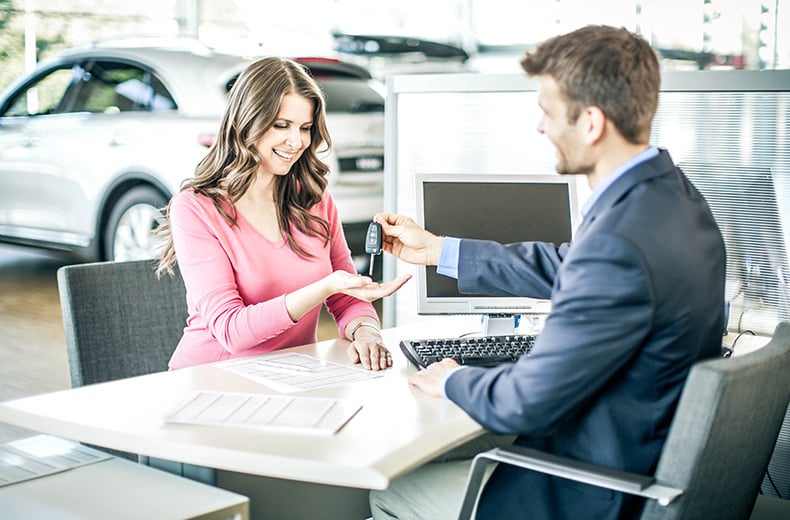
You’ve found a secondhand car, checked the paperwork, done an RAC history check, been on a test drive and now you’re ready to go ahead and do a deal.
This is potentially the most challenging part of buying a car - how should you go about it?
How to get the best deal on a used car
No matter where or who you’re buying a car from, our best advice is to be polite and fair.
It’s human nature to want some money off and, while some sellers will be open to negotiating, others will be less keen.
Take a positive approach and view it as a challenge - sellers rarely respond well to buyers making insulting offers and taking an over-the-top approach to haggling.
Walk around the car with the seller and highlight any issues you’ve found.
They’re likely to already know about these - and may have already taken them into account when pricing the car - but it’ll help them see it from your point of view.
Before going to see the car, you should have looked into how it compares with others on the market (bearing in mind trade sales should be more expensive than private), so you’ll know how much it’s worth.
With this in mind, set your budget in advance and stick to it.
If you feel the car is overpriced for the condition it’s in, make an offer and be prepared to walk away if the seller isn’t willing to move.
You may find that the seller makes a counter offer - if not straight way, perhaps when you’ve driven home and showed you’re not willing to pay more money.
If you’re buying from a dealer, there may be scope to get some extras thrown in free rather than simply money off.
Ask for a full tank of fuel, for example, or a service or MOT if the car needs it.
Avoid being pressurised into buying a used car.
If you're not 100% sure on the car, walk away – there will always be more to see.
Don't buy a car from a private seller in a public place.
View it at their home so you can see the address matches the V5 keeper's document.
How are you going to pay for the car / payment methods
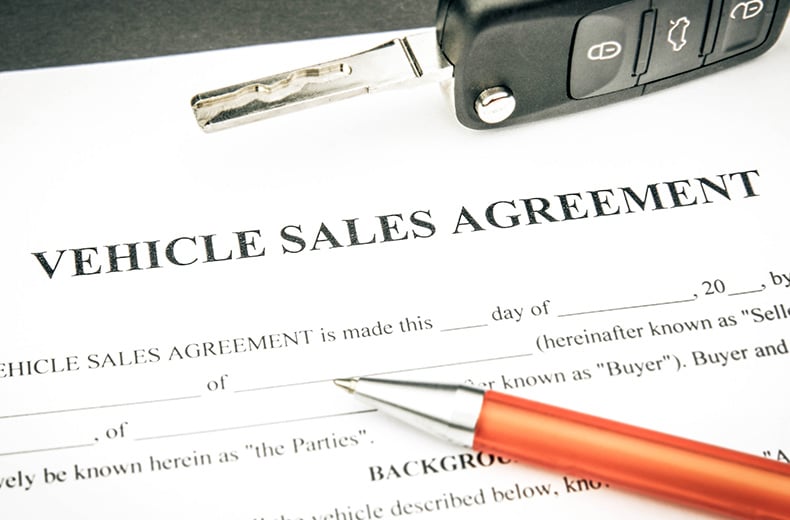
Once you’ve found the car and agreed a deal, the next step is paying for it.
The best way of doing that depends a lot on the value of the car - while producing a wad of £20 notes might be the best way of paying for a £500 car, doing so for a £20,000 motor could get you into a lot of trouble.
You could pay using a cheque, but the seller will want funds to clear before you drive away.
Alternatively, transfer the money using online or telephone banking - this will be quicker than a cheque, but might not be instant.
A banker’s draft is quicker, but you’ll have to pay a fee for this.
If you’re buying a car from a dealer and it’s relatively cheap, you might be able to put the car on a credit card, although you might have to pay a small fee for this.
Many dealers offer finance, but the rates on secondhand cars often aren’t as competitive as taking out a personal loan.
You can get a quick personalised loan rate in just three minutes from the RAC for up to £25,000 without affecting your credit score.
What to do before you hand over the money
Before transferring funds, please ensure that you are completely satisfied with what you are buying.
When transferring funds, ensure that you use a trackable method of payment such as a credit or debit card as paying by cash is far harder to trace.
Please note: It is important to be wary of online sellers and to ensure you research the seller thoroughly.
If you’ve followed all these steps, you should be in a good position when handing over the money.
Ask for a receipt for the money - including any agreement such as work to be carried out before collection as well as the date and the car’s current mileage.
10 questions to ask the seller when buying a used car
Buying a used car can be stressful, but if you think you’ve found the right car for you make sure you ask the seller these 10 questions to give yourself some peace of mind:
1. Can I see the car?
This might sound like a redundant question, but if you’re buying privately online it’s imperative you see the car and inspect it with your own eyes before parting with any money. Never buy a car from a private seller without seeing it first.
2. Can the car be legally sold?
This is a biggie. If a car can’t be legally sold for any reason – if it’s been written off or subject to outstanding finance – then, put simply, don’t buy it. If you do, you’ll be left driving illegally and could face a fine, a ban, or even repossession.
3. Why are you selling the car?
You can dress it up as simply making conversation, but put the seller on the spot by asking specific questions about why they want to part with the car. This could catch them out and throw up something that wasn’t included in the description.
4. Can I see the paperwork?
A used car should come with a set of documents – including V5C certificate and full service history – so ask to see them. You can check a car’s history against what you find on the RAC’s vehicle history tool.
5. How many previous owners has it had?
Generally speaking, the more owners a car has had, the less it’s worth. So, whether the car you’re looking at has had seven owners or just the one, it should be reflected in the price.
6. Has the car been in an accident?
If the car’s been in an accident, there could be internal damage not included in the description. Worse still, if the car’s been written off then it might not even be legal to sell it on, meaning you could be left with an illegal motor if you buy it.
7. Are you the registered keeper?
If the seller isn’t the car’s registered keeper it’s unlikely they’ll be able to answer any of your questions about the vehicle. It might be that they’re simply selling it for a family member, but exercise some caution before proceeding.
8. Is the car ‘as described’?
Sellers are obliged to sell a car ‘as described’, meaning the actual vehicle matches what’s included in the description. Take the listing along with you and use it to check against the seller’s answers to make sure.
9. Can I drive it home?
If the seller says you can drive it home, that means it’s roadworthy, has an MOT and has no known problems that’ll cause it to break down on the way home. If you find out that’s not the case, the car won’t have been sold ‘as described.’
10. Can I take it on a test drive?
The best way to see how a car drives is by getting behind the wheel yourself so you can check its steering, braking, suspension, and more. If a seller doesn’t want you to test drive the car it could be a sign that all is not well with the car.
What are your buyer’s rights for a used car?
Under the Consumer Rights Act, all cars bought from a dealer or trader must be of satisfactory quality, fit for purpose and as described.
It is also true that, whether bought through a dealer, or privately, the vehicle you buy must be roadworthy which means it must be fit and safe to drive.
Section 75 of the Road Traffic Act 1988 states that it is illegal for anyone to sell a vehicle that is not roadworthy.
If you can demonstrate that there is a fault with the vehicle, you will be entitled to a number of remedies depending on when you bring the fault to the trader’s attention:
- Within the first 30 days from taking delivery of the vehicle: Should you reject the vehicle within the first 30 days because of a fault which you can demonstrate you will be entitled to a full refund when you return the vehicle. If you prefer a repair or a replacement, the trader must do this for you within a reasonable time and without causing your significant inconvenience
- From the 31st day until the first six months: Should you have experience a fault with the vehicle, you are entitled to a repair or a replacement from the trader. Should the repair or replacement not address the problem you are complaining of, you will be entitled to reject the vehicle and then claim a refund (which can be reduced as a result of your fair use) or, if you prefer to, keep the vehicle and receive a fair price reduction. It is worth noting that as long as you can demonstrate that a fault exists, it is presumed that the fault was there when you took delivery of the vehicle. It would be for the trader to prove that you had caused the fault since you took delivery of the vehicle.
- From six months and up to six years: Should you experience a fault with the vehicle after six months and you can prove that the fault was present at the time of delivery, you will be entitled to a repair or replacement. Should the repair or replacement not address the problem you are complaining of, you will be entitled to a choice of rejecting the vehicle and claim a refund (which can be reduced as a result of your fair use) or keep the vehicle and receive a fair price reduction. However, after the six-month period, the burden of proof is reversed and a consumer will have to show that the goods were defective at the time of delivery.
- After six years: You are not entitled to any legal remedy under the laws of England and Wales (5 years in Scotland)
If you pay for all or part of the vehicle via credit card, you may be able to seek redress from your credit card provider.
They can be jointly responsible for problems with your vehicle under The Consumer Credit Act 1974.
If your vehicle is subject to a finance or lease agreement, your options may vary considerably.
Escalating an issue to court? What's the procedure
If you cannot come to an amicable resolution with the dealership, there is a process in place which can still provide a remedy.
If giving them an opportunity to remedy any breaches of contract do not come to fruition, the next stage is to send a ‘letter before action’.
A helpful website for the court process can be found here.
An MOT is not proof of roadworthiness
Please note that an MOT certificate from a test several months ago is no guarantee that the vehicle is roadworthy on the day you are looking to buy it.
The MOT certificate can also highlight any issues that the owner or registered keeper was advised to monitor with a view to putting right.
If you think you have been sold an unroadworthy vehicle, report it to your local Trading Standards and the Driver and Vehicle Standards Agency (DVSA).
A V5C doc is not proof of ownership
It is worth noting that a V5C is not proof of ownership of a vehicle, but does state the registered keeper at the time.
It’s a good idea to request to see proof of ownership from the seller i.e. a receipt or invoice.
Buyer's rights summary
You’ll have less protection if you’ve bought a car privately.
The key is to ask as many questions as possible - while sellers don’t have to volunteer information, they’re on rocky ground legally if they tell lies about the car’s condition or history.
It must be described accurately, so if the car’s advertised as having air conditioning and you find out on the way home that it doesn’t, you could ask for a full refund.
Arranging tax and insurance for your used car
Before you drive the car away, you legally have to take out insurance and pay for VED (vehicle excise duty - road tax).
The easiest way of obtaining car insurance before driving home in a new car is to get a quote beforehand, then all you need to do is go online or phone up to accept it when you’re ready to take out the policy.
You can tax a car using the ‘new keeper’s slip’ of the V5 on the DVLA’s website. Alternatively, phone the DVLA’s 24-hour automated service on 0300 123 4321 or visit a nearby Post Office.
- Did you know that we offer specialist learner driver insurance?
- Looking to do a test drive? RAC Temporary Car Insurance covers you for as little as an hour
If you are looking at buying a used car, then we strongly recommend you use our RAC Vehicle History Check. This will offer an in-depth report on the car's full history, helping you make an informed decision.
Buying a used car FAQs
- How many miles should I buy a used car with?
According to the Department for Transport, the average UK annual mileage is around 7,000 miles, so bear that in mind when checking the clock of second-hand cars against their age.
However, while cars with fewer miles on the clock might seem a better bet, lower mileage doesn’t necessarily mean the car is in a better condition, so make sure you carry out all other necessary checks too.
- How much is a discount on a used car from a dealer?
Remember that in any negotiation it’s always a good idea to stay polite, positive and fair. While the dealer is there to make a sale, sellers rarely respond well to over-zealous negotiating tactics.
The amount discounted will largely depend on the vehicle in question, so make sure you’ve done your research on the market price of the car beforehand and look out for any issues that could force a price reduction.
- How much can you haggle on a used car?
That depends on your haggling skills. If you feel uncomfortable haggling, you may want to take along a friend, or purchase elsewhere. If you do plan on haggling, decide on a price you can pay and don’t go above it.
The most important thing to remember when haggling on a used car is that you need to know what you’re talking about, so do some research on the market price before entering into negotiations.
- What used cars NOT to buy?
Used cars best avoided will depend on your circumstances and the car in question. A simple internet search will highlight any wider issues with the manufacturer or model, while an RAC Vehicle History Check will give you more in-depth analysis of a particular vehicle.
- What to do after buying a used car?
You should ensure you already have car insurance and road tax that will let you drive your car home legally.
Once you have transported it home, familiarise yourself with your new car (including reading the owner’s manual thoroughly) and sort out breakdown cover to give you extra peace of mind on the roads. - Can you drive a car you just bought?
Before you drive the car away, you legally have to take out insurance and pay for VED (vehicle excise duty – i.e. road tax).
When buying from a dealership, many manufacturers will put in place a temporary insurance policy to cover your first month or so behind the wheel. Otherwise, the easiest way of obtaining insurance before driving home in a new car is to get a quote beforehand, then all you need to do is go online or phone up to accept it when you’re ready to take out the policy.
You can tax a car using the ‘new keeper’s slip’ of the V5 on the DVLA’s website. Alternatively, phone the DVLA’s 24-hour automated service on 0300 123 4321 or visit a nearby Post Office.
- Is buying a car with over 100k miles bad?
That depends on the age and service history of the vehicle. If the car is well-maintained and has a full-service history, buying a used car with over 100k miles on the clock might not be a bad thing at all. However, it’s essential that you’re aware of the potential risks of buying a car with a higher mileage, and that it could mean certain issues present themselves more readily than on a car with less miles.
- What mileage is too high for a used car?
There isn’t a set figure you should avoid, just make sure you do plenty of checks and ask lots of questions to uncover any issues. High mileage cars tend to be cheaper and depending on the previous owner and how well it was serviced, it could be just as reliable a motor as one with only 5,000 miles on the clock.
There was a time when a high mileage would be seen as a turn-off by buyers in the used-car market, however these days a high number on the odometer doesn’t necessarily mean a car should be avoided.
- When is the best time to buy a used car?
The best months to buy a used car are generally March and September. This is due to the new registration plates being introduced, which swells the used car market as owners look to purchase new models.
- What documents should I get when buying a used car?
When purchasing a used car, you should ensure you receive the registration document (V5C), the MOT certificate, a full service history and any write-off car checks (if applicable).
You should always check that these documents match with the car in question and that everything is above board and checks out. Carry out your own vehicle check using the RAC’s tool for extra peace of mind.
- Can I drive a car without insurance if I just bought it?
No. Driving a car without insurance is an offence and if you’re caught on public roads without cover you face a fine, penalty points on your licence and even a driving ban so it’s not worth the risk.
When buying from a dealership, many manufacturers will put in place a temporary insurance policy to cover your first month or so behind the wheel. Otherwise, the easiest way of obtaining insurance before driving home in a new car is to get a quote beforehand, then all you need to do is go online or phone up to accept it when you’re ready to take out the policy.
Alternatively, you may prefer to take out a temporary insurance policy – see the RAC’s policy options if you’re looking for temporary cover. - Do I need insurance before I buy a used car?
If you’re planning on driving your new purchase home, you’ll need VED (road tax) and insurance to ensure you’re not breaking the law. The easiest way of obtaining insurance before driving home in a new car is to get a quote beforehand, then all you need to do is go online or phone up to accept it when you’re ready to take out the policy.
Alternatively, you may prefer to take out a temporary insurance policy – see the RAC’s policy options if you’re looking for temporary cover.
- Is it better to buy a used car?
Some people prefer to buy new – there’s less chance of encountering a problem if you drive a car off the forecourt and there’s that all-important new car smell.
However, others will choose a used car as there’s often more flexibility in the used car market and second-hand motors generally represent better value for money.
- Should I pay cash for a used car?
If the car in question is less than £500, cash might be a preferable payment method, but for larger amounts you may wish to agree on a payment method with the seller beforehand.
You should never part with money if you’re not completely satisfied with what you’re buying and should you feel intimidated to pay with cash you may want to walk away from the sale.
- What are my rights when buying a used car?
Under the Consumer Rights Act, all cars bought from dealers must be of satisfactory quality, fit for purpose and as described. Vehicles bought through a dealer or privately must be roadworthy – i.e. fit and safe to drive.
Section 75 of the Road Traffic Act 1988 states that it’s illegal for anyone to sell a vehicle that is not roadworthy. If you can demonstrate a fault with a newly-purchased used car, you have several options. Find out more here.
- How long does the car buying process take?
Buying a used car can be a quick process, especially if you’re buying from private sellers looking for a speedy sale. It’s possible you could see a listing in the morning and be driving home with your (insured and taxed) car in the afternoon.
However, it’s important you don’t feel pressured to make a purchase by a seller. If something doesn’t seem right to you then feel free to back away from the sale and keep your options open.
Buying and selling guide FAQ
- What documents are required when buying a second hand car?
The documents required for a second-hand car purchase in the UK are:
1. V5C Logbook: This document is also known as the ‘registration certificate’ and is the most important document required to purchase a second-hand car in the UK. The V5C Logbook includes the car’s registration number, make and model, as well as the details of the current registered keeper. The seller must provide you with a valid V5C Logbook, otherwise the transaction is not legal.
2. MOT Certificate: A valid MOT certificate demonstrates that the car is fit to be driven on public roads in the UK. The MOT certificate will be issued by the DVLA (Driver and Vehicle Licensing Agency) once the car has passed its annual MOT test.
3. Car Insurance Certificate: The seller must provide you with a valid car insurance certificate, which shows that the car is insured for the period of time that you will be driving it.
4. Service History: The seller should be able to provide you with a service history for the car, which includes records of any repairs and maintenance that have been completed on the car. This is important as it demonstrates that the car has been well maintained and is in good condition.
5. Proof of Ownership: The seller must provide you with proof of ownership, which typically includes a valid photo identification such as a driver’s licence. - Do I need a receipt when buying a car privately?
When buying a car from a private seller, it’s always important to make sure that you get a receipt for the transaction. A receipt can provide valuable evidence in the event of a dispute, so it’s a good idea to get one even if you’re buying from a friend or family member. The most important thing is to make sure that the receipt is detailed and accurate. It should include the make, model, year and VIN of the car, along with the price you paid and the date of sale. It should also include the name and contact information of the seller. The receipt should be signed by both you and the seller and should be kept in a safe place. Make sure to keep a copy for yourself and give a copy to the seller.
- Does sold as seen still apply private sale?
When selling a used item privately, the term “sold as seen” is often used to indicate that the buyer is purchasing the item in its current condition and cannot return the item for a refund. This term is typically used to protect the seller from any claims of misrepresentation of the item and to make the buyer aware of the condition of the item before purchase. When selling a used item privately, the “sold as seen” term is usually still applicable. However, it is important to note that the Consumer Rights Act 2015 states that all goods must be of satisfactory quality and fit for purpose, even when sold as seen. If the item is not of satisfactory quality or fit for purpose, then the buyer may be entitled to a refund or replacement, regardless of the “sold as seen” term.
In addition, the seller may be liable for any damage or injury caused by a fault in the item if they fail to disclose the fault to the buyer prior to the purchase. Therefore, it is important for the seller to make the buyer aware of any known defects or faults with the item before the sale is completed.
- What is the best guideline before purchasing a used vehicle?
Here are the best guidelines to follow before purchasing a used vehicle:
1. Set a budget and stick to it. Before looking at used vehicles, make sure you have a budget in mind and stick to it. Don’t be swayed by a too-good-to-be-true deal.
2. Get a vehicle history report. Make sure to get a vehicle history report on the used vehicle before purchasing. This will provide you with important information such as service history, accidents, and previous ownership.
3. Have a mechanic inspect the vehicle. Before buying a used vehicle, make sure to have a mechanic inspect it to make sure the vehicle is in good condition.
4. Get the best possible deal. Negotiate the price with the seller and make sure you get the best deal possible.
5. Take a test drive. Before making the purchase, take the vehicle for a test drive to get a feel for how it handles and make sure there are no major issues. - What is the best payment method to buy a car?
In short, the best way to pay for a used vehicle is through an online bank transfer. However, you should inform your bank before you proceed as they won’t be expecting larger than normal sums to be leaving your bank account.


